Cepomic Duo 100 mg Suspension 30 ml
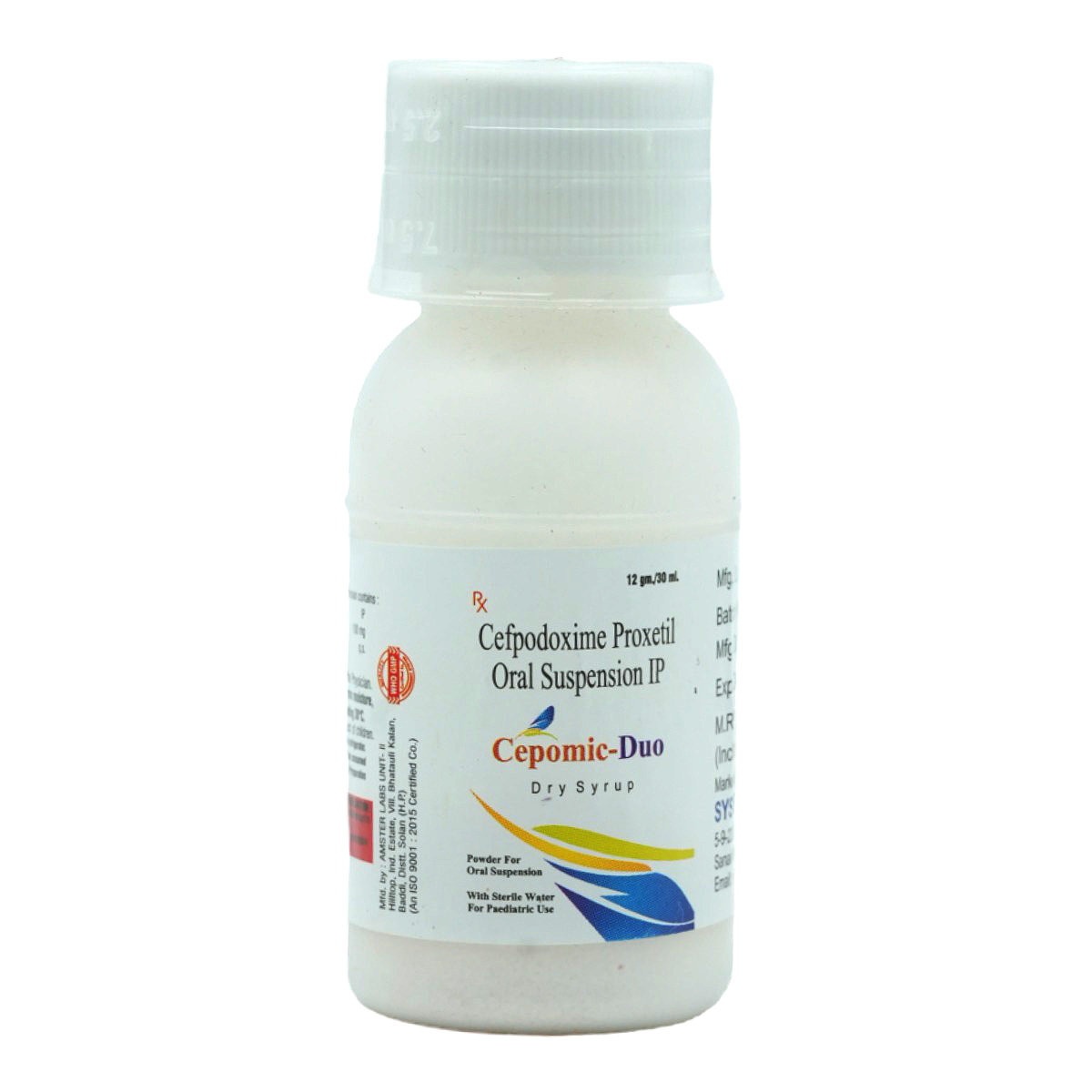
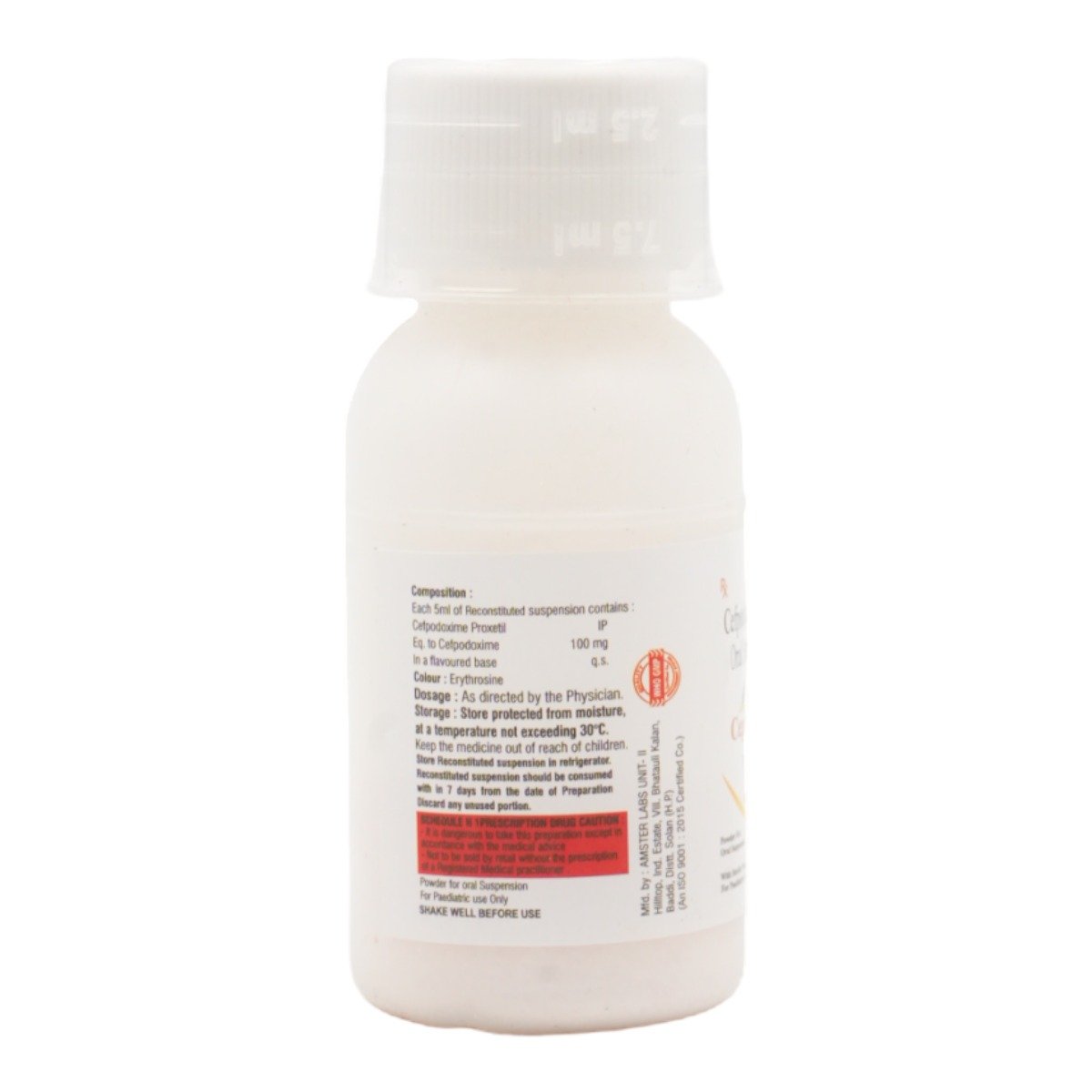
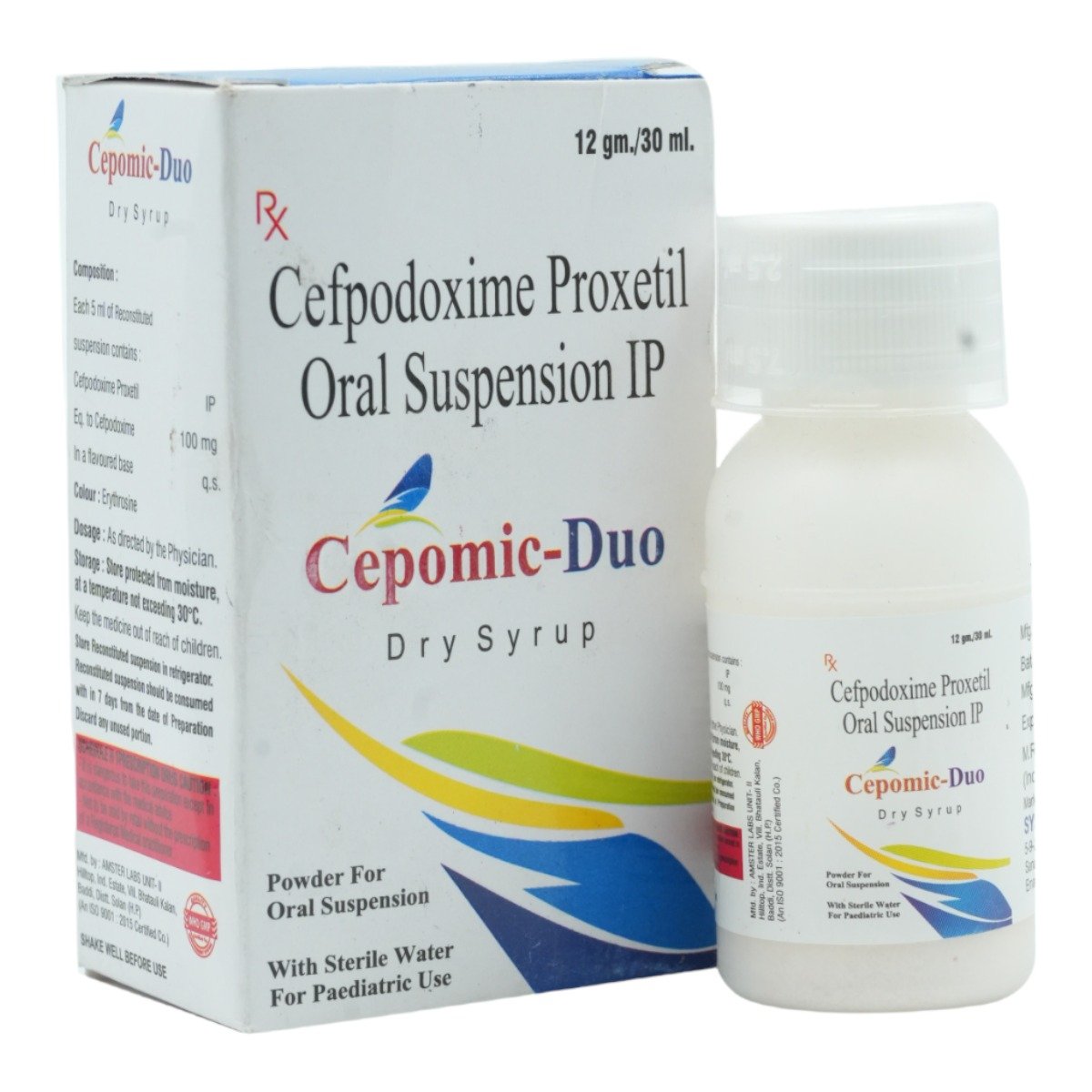
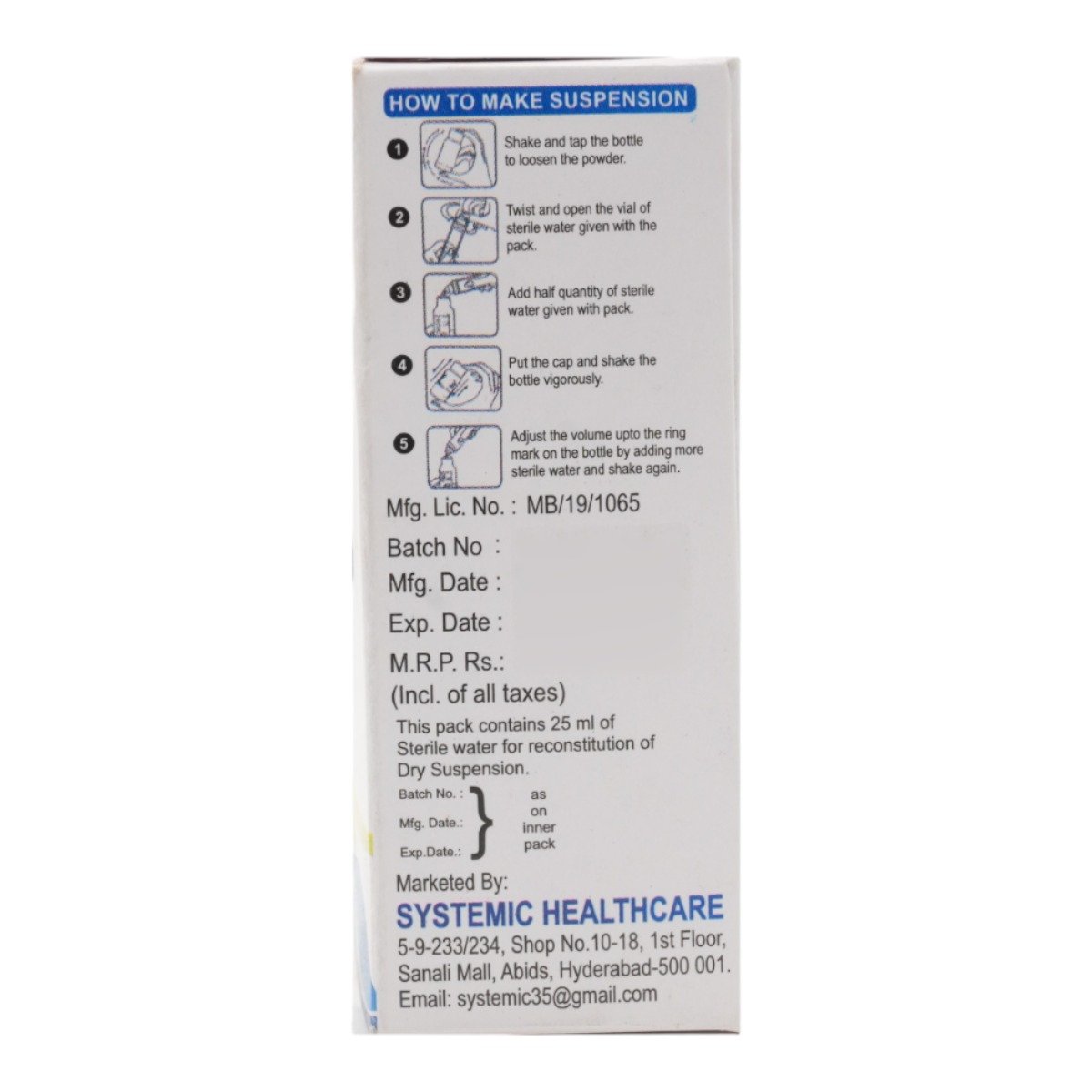
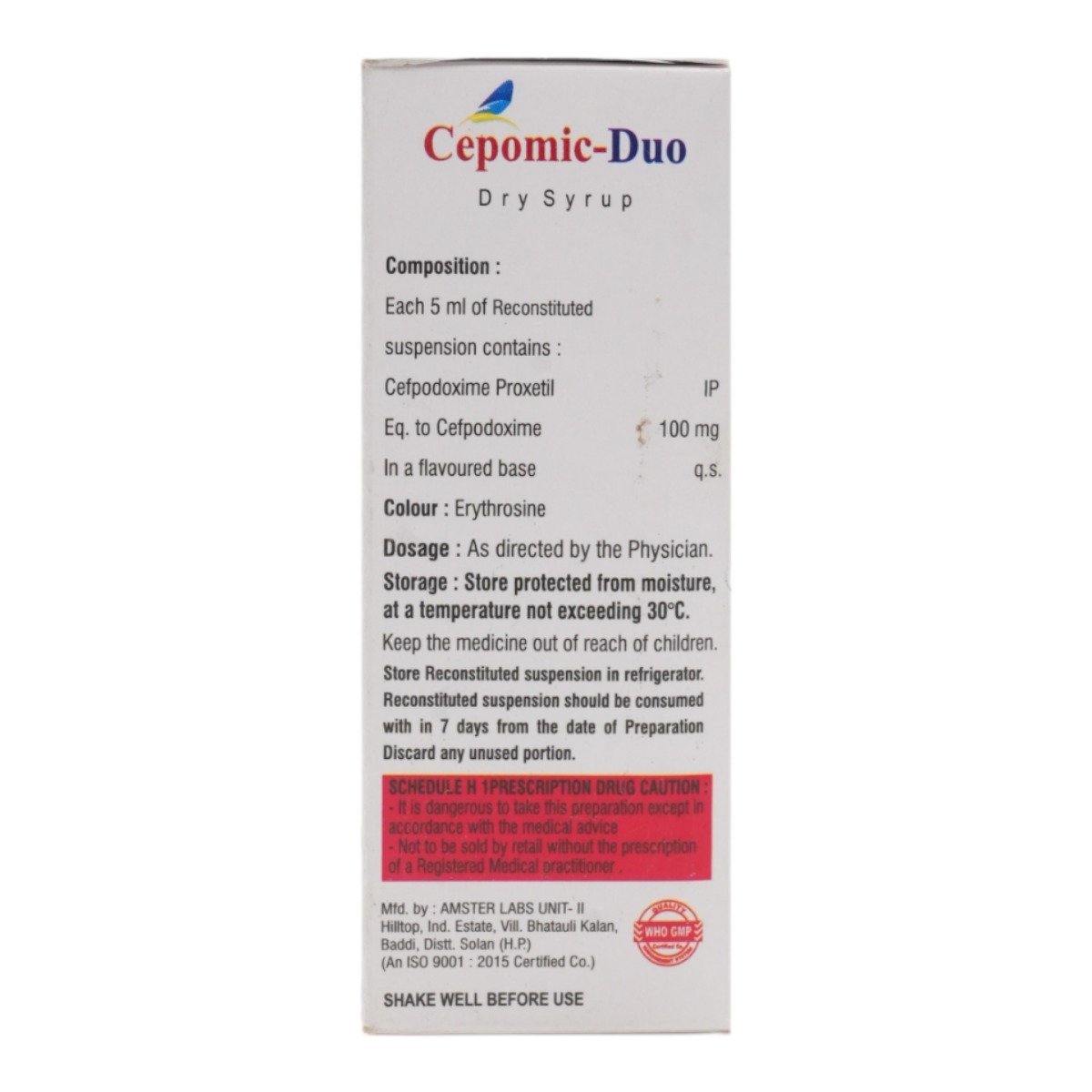
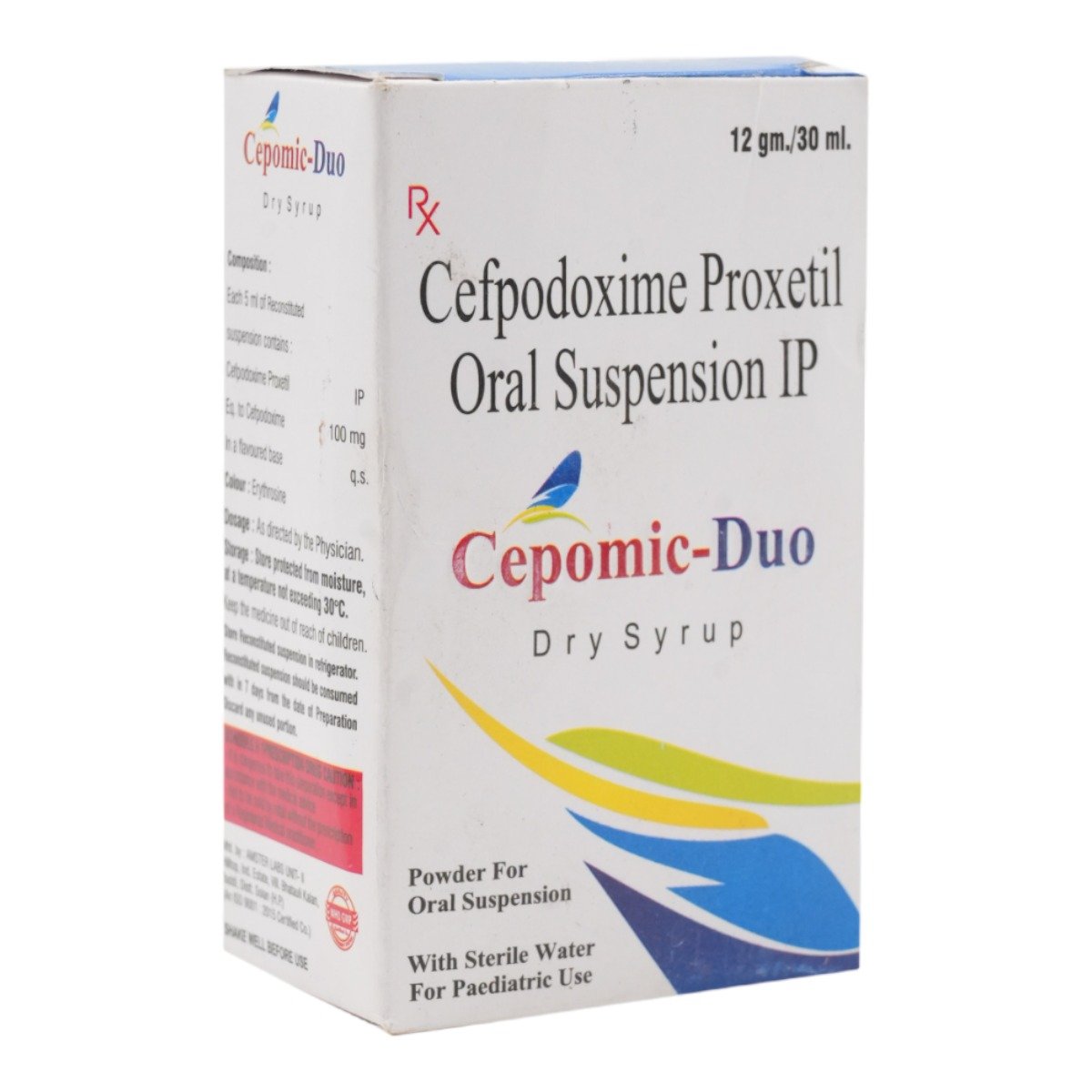
MRP ₹160
(Inclusive of all Taxes)
₹24.0 Cashback (15%)
Cepomic Duo 100 mg Suspension is used to treat bacterial infections such as respiratory tract infections, including infections of the lungs, throat, tonsils, and sinus cavities in children. It contains Cefpodoxime, a broad-spectrum antibiotic effective against both gram-positive and gram-negative bacteria. It works by preventing the formation of the bacterial cell covering (cell wall), which is necessary for their survival. Thereby, it kills the bacteria and helps in treating bacterial infections.
Know Your Delivery Time
Provide Delivery Location

Secure Payment

India's Most Trusted Pharmacy

Genuine Products
Composition :
Manufacturer/Marketer :
Consume Type :
Return Policy :
Expires on or after :
About Cepomic Duo 100 mg Suspension
Cepomic Duo 100 mg Suspension belongs to the group of cephalosporin antibiotics indicated in the treatment of bacterial infections. Bacterial infections are caused by the multiplication of harmful bacteria inside or on the body. Cepomic Duo 100 mg Suspension does not work against infections caused by the virus, including cold and flu.
Cepomic Duo 100 mg Suspension contains Cefpodoxime, which is a broad-spectrum antibiotic effective against both gram-positive and gram-negative bacteria. Cepomic Duo 100 mg Suspension works by preventing the formation of the bacterial cell covering (cell wall), which is necessary for their survival. Thereby, Cepomic Duo 100 mg Suspension kills the bacteria and helps in treating bacterial infections.
In some cases, Cepomic Duo 100 mg Suspension may cause side effects such as nausea, vomiting, diarrhoea (watery or loose stool), and abdominal pain. Most of these side effects do not require medical attention and will resolve gradually over time. However, you are advised to talk to the doctor if the side effects persist or worsen.
Let the doctor know if your child is allergic to any of the components in Cepomic Duo 100 mg Suspension. Keep the doctor informed about your child's health condition and medications to rule out any unpleasant side effects/interactions.
Uses of Cepomic Duo 100 mg Suspension
Cepomic Duo 100 mg Suspension is used to treat various bacterial infections in children. The detailed uses of Cepomic Duo 100 mg Suspension are as follows:
- Treatment of respiratory tract infections:Cepomic Duo 100 mg Suspension treats infections such as pneumonia, bronchitis, and tonsillitis.
- Management of ear infections (otitis media):Effectively treats middle ear infections, reducing pain and fever.
- Treatment of throat and sinus infections:Used to manage pharyngitis, sinusitis, and other upper respiratory infections.
- Urinary tract infections (UTIs): Helps eliminate bacteria causing UTIs.
- Skin and soft tissue infections: Treats bacterial skin infections such as impetigo and cellulitis.
- Gastrointestinal infections: Treats bacterial diarrhoea and typhoid fever in children.

Have a query?
Directions for Use
- Cepomic Duo 100 mg Suspension can be administered with or without food as directed by the doctor.
- Follow your doctor's instructions on the dosage and timing of this medication to ensure safety.
- Administer the prescribed dose to the child using the measuring cup/dosing syringe/dropper.
- Shake well before use.
Medicinal Benefits
Cepomic Duo 100 mg Suspension belongs to the group of cephalosporin antibiotics indicated in the treatment of bacterial infections such as respiratory tract infections, including infections of the lungs, throat, tonsils, and sinus cavities. Cepomic Duo 100 mg Suspension contains 'Cefpodoxime', which is a broad-spectrum antibiotic effective against both gram-positive and gram-negative bacteria. Cepomic Duo 100 mg Suspension works by preventing the formation of the bacterial cell covering (cell wall), which is necessary for their survival. Thereby, Cepomic Duo 100 mg Suspension kills the bacteria and helps in treating bacterial infections.
How Cepomic Duo 100 mg Suspension Works
Storage
- Inform Your Doctor: Notify your doctor immediately about your diarrhoea symptoms. This allows them to adjust your medication or provide guidance on managing side effects.
- Stay Hydrated: Drink plenty of fluids to replace lost water and electrolytes. Choose water, clear broth, and electrolyte-rich drinks. Avoid carbonated or caffeinated beverages to effectively rehydrate your body.
- Follow a Bland Diet: Eat easy-to-digest foods to help firm up your stool and settle your stomach. Try incorporating bananas, rice, applesauce, toast, plain crackers, and boiled vegetables into your diet.
- Avoid Trigger Foods: Steer clear of foods that can worsen diarrhoea, such as spicy, fatty, or greasy foods, high-fibre foods, and dairy products (especially if you're lactose intolerant).
- Practice Good Hygiene: Maintain good hygiene to prevent the spread of infection. To stay healthy, wash your hands frequently, clean and disinfect surfaces regularly, and avoid exchanging personal belongings with others.
- Take Anti-Diarrheal Medications: If your doctor advises, anti-diarrheal medications such as loperamide might help manage diarrhoea symptoms. Always follow your doctor's directions.
- Keep track of your diarrhoea symptoms. If they don't get better or worse or are accompanied by severe stomach pain, blood, or dehydration signs (like extreme thirst or dark urine), seek medical help.
- Inform your doctor about the nausea and discuss possible alternatives to the medication or adjustments to the dosage.
- Divide your daily food intake into smaller, more frequent meals to reduce nausea.
- Opt for bland, easily digestible foods like crackers, toast, plain rice, bananas, and applesauce.
- Avoid certain foods that can trigger nausea, such as fatty, greasy, spicy, and smelly foods.
- Drink plenty of fluids, such as water, clear broth, or electrolyte-rich beverages like coconut water or sports drinks.
- Use ginger (tea, ale, or candies) to help relieve nausea.
- Get adequate rest and also avoid strenuous activities that can worsen nausea.
- Talk to your doctor about taking anti-nausea medication if your nausea is severe.
- Record when your nausea occurs, what triggers it, and what provides relief to help you identify patterns and manage your symptoms more effectively.
- Hydrate your body: Drink enough water to prevent dehydration and headaches.
- Calm Your Mind: Deep breathing and meditation can help you relax and relieve stress.
- Rest and Recharge: Sleep for 7-8 hours to reduce headache triggers.
- Take rest: lie down in a quiet, dark environment.
- Cold or warm compresses can help reduce tension.
- Stay Upright: Maintain good posture to keep symptoms from getting worse.
- To treat headaches naturally, try acupuncture or massage therapy.
- Over-the-counter pain relievers include acetaminophen and ibuprofen.
- Prescription Assistance: Speak with your doctor about more substantial drug alternatives.
- Severe Headaches: Seek emergency medical assistance for sudden, severe headaches.
- Frequent Headaches: If you get reoccurring headaches, consult your doctor.
- Headaches with Symptoms: Seek medical attention if your headaches include fever, disorientation, or weakness.
What if I have taken an overdose of Cepomic Duo 100 mg Suspension
Drug Warnings
Do not give Cepomic Duo 100 mg Suspension to the child if they are allergic to any of its components. Inform the doctor if your child is allergic to penicillin antibiotics or has kidney problems. If your child is on any other medications, including vitamin/mineral supplements or herbal products, tell your doctor.
Drug-Drug Interactions
Drug-Drug Interactions
Login/Sign Up
Co-administration of Cepomic Duo 100 mg Suspension 30 ml with the Cholera vaccine may reduce the effectiveness of the vaccine.
How to manage the interaction:
Talk to your doctor before receiving the Cholera vaccine if you are currently being treated with Cepomic Duo 100 mg Suspension 30 ml or have been treated within the last 14 days. To ensure adequate vaccine response, you should not receive cholera vaccine until at least 14 days after you complete your antibiotic therapy. Do not discontinue the medication without consulting a doctor.
Co-administration of Cepomic Duo 100 mg Suspension 30 ml with Heparin may enhance the levels or effects of heparin by anticoagulation (preventing blood from clotting).
How to manage the interaction:
Although there is an interaction, Cepomic Duo 100 mg Suspension 30 ml can be taken with Heparin if prescribed by the doctor. Do not stop using any medications without a doctor's advice. Do not discontinue the medication without consulting a doctor.
Drug-Food Interactions
Drug-Food Interactions
Login/Sign Up
Diet & Lifestyle Advise
- Antibiotics can alter the useful bacteria in the stomach, which help in digestion. Therefore, you are advised to give the child foods rich in probiotics.
- Include fibre-rich food like whole grains, beans, lentils, berries, broccoli, peas and bananas in their diet.
- Make sure your child is well-rested.
Habit Forming
Therapeutic Class
All Substitutes & Brand Comparisons
RX
Rexdoxim 100 mg Suspension 30 ml
Adirex Pharmaceuticals Pvt Ltd
₹126
(₹3.78/ 1ml)
21% CHEAPERRX
Dgpod 100 Suspension 30 ml
Dhavit Global Life Sciences Pvt Ltd
₹148
(₹4.44/ 1ml)
7% CHEAPERRX
Podxetil 100mg Suspension 30 ml
Koye Pharmaceuticals Pvt Ltd
₹154
(₹4.62/ 1ml)
3% CHEAPER
Alcohol
Not applicable
-
Pregnancy
Not applicable
-
Breast Feeding
Not applicable
-
Driving
Not applicable
-
Liver
Consult your doctor
Please consult the doctor if your child has a liver impairment or if you have any concerns regarding this.
Kidney
Consult your doctor
Please consult the doctor if your child has a kidney problem or if you have any concerns regarding this.
Children
Safe if prescribed
Cepomic Duo 100 mg Suspension is safe for children if prescribed by the doctor. Your doctor may prescribe the dose and duration based on the child's condition and age.
Heart
If your child has any heart disease, please consult a doctor before giving Cepomic Duo 100 mg Suspension.
Geriatrics
Not applicable
Cepomic Duo 100 mg Suspension is for paediatric patients only.
FAQs
Cepomic Duo 100 mg Suspension is used to treat bacterial infections.
Cepomic Duo 100 mg Suspension works by preventing the formation of bacterial cell covering, which is necessary for their survival. This kills the bacteria and helps in treating bacterial infections.
Cepomic Duo 100 mg Suspension may cause diarrhoea. If the child experiences diarrhoea, give them water and non-spicy food. Consult a doctor if the condition persists or worsens.
To treat the condition effectively, it is recommended that the course of Cepomic Duo 100 mg Suspension be completed even if the child feels better. Leaving it in between may lead to a severe infection that will, in fact, stop responding to the antibiotic as well (antibiotic resistance).
Cepomic Duo 100 mg Suspension may cause side effects such as nausea, vomiting, diarrhoea (watery or loose stool), and abdominal pain. Talk to the doctor if the side effects persist or worsen.
Country of origin
Manufacturer/Marketer address
Disclaimer
Buy best Infections & Infestation products by
Cipla Ltd
Macleods Pharmaceuticals Ltd
Alkem Laboratories Ltd
Lupin Ltd
Abbott India Ltd
Mankind Pharma Pvt Ltd
Sun Pharmaceutical Industries Ltd
Micro Labs Ltd
Aristo Pharmaceuticals Pvt Ltd
Intas Pharmaceuticals Ltd
FDC Ltd
Glenmark Pharmaceuticals Ltd
Ipca Laboratories Ltd
Zydus Healthcare Ltd
United Biotech Pvt Ltd
Torrent Pharmaceuticals Ltd
Emcure Pharmaceuticals Ltd
Leeford Healthcare Ltd
Zuventus Healthcare Ltd
Hetero Drugs Ltd
Biochem Pharmaceutical Industries Ltd
Dr Reddy's Laboratories Ltd
Fusion Health Care Pvt Ltd
Alembic Pharmaceuticals Ltd
Cadila Healthcare Ltd
Zydus Cadila
Indoco Remedies Ltd
Wockhardt Ltd
AAA Pharma Trade Pvt Ltd
Morepen Laboratories Ltd
Cadila Pharmaceuticals Ltd
Converge Biotech Pvt Ltd
GlaxoSmithKline Pharmaceuticals Ltd
Gufic Bioscience Ltd
Elder Pharmaceuticals Ltd
Blue Cross Laboratories Pvt Ltd
Capital Pharma
Hetero Healthcare Pvt Ltd
Alniche Life Sciences Pvt Ltd
Mylan Pharmaceuticals Pvt Ltd
Medishri Healthcare Pvt Ltd
Akumentis Healthcare Ltd
Corona Remedies Pvt Ltd
Apex Laboratories Pvt Ltd
Pfizer Ltd
Vasu Organics Pvt Ltd
Wallace Pharmaceuticals Pvt Ltd
Veritaz Healthcare Ltd
Samarth Life Sciences Pvt Ltd
Koye Pharmaceuticals Pvt Ltd
Unifaith Biotech Pvt Ltd
Laborate Pharmaceuticals India Ltd
Hegde & Hegde Pharmaceutica Llp
Overseas Health Care Pvt Ltd
Shreya Life Sciences Pvt Ltd
Canixa Life Sciences Pvt Ltd
East West Pharma India Pvt Ltd
Lincoln Pharmaceuticals Ltd
Ranbaxy Laboratories Ltd
Biocon Ltd
Klm Laboratories Pvt Ltd
Natco Pharma Ltd
Zymes Bioscience Pvt Ltd
Biochemix Health Care Pvt Ltd
Medley Pharmaceuticals Ltd
Pristine Pearl Pharma Pvt Ltd
Ajanta Pharma Ltd
Allites Life Sciences Pvt Ltd
Indchemie Health Specialities Pvt Ltd
Brinton Pharmaceuticals Ltd
German Remedies Ltd
J B Chemicals & Pharmaceuticals Ltd
Neon Laboratories Ltd
Unichem International
Yuventis Pharmaceuticals
Aurz Pharmaceutical Pvt Ltd
Unipark Biotech Pvt Ltd
Celon Laboratories Pvt Ltd
DR Johns Lab Pharma Pvt Ltd
Icarus Health Care Pvt Ltd
Kivi Labs Ltd
La Renon Healthcare Pvt Ltd
Medgen Drugs And Laboratories Pvt Ltd
Megma Healthcare Pvt Ltd
Aequitas Healthcare Pvt Ltd
Aionios Pharma Pvt Ltd
BDR Pharmaceuticals Internationals Pvt Ltd
Kepler Healthcare Pvt Ltd
Indiabulls Pharmaceuticals Pvt Ltd
Suraksha Pharma Pvt Ltd
Concord Biotech Ltd
Fresenius Kabi India Pvt Ltd
Lividus Pharmaceuticals Pvt Ltd
Nicholas Piramal India Ltd
Novartis India Ltd
Zee Laboratories Ltd
Auspharma Pvt Ltd
Biological E Ltd
Intra Life Pvt Ltd
Knoll Healthcare Pvt Ltd




